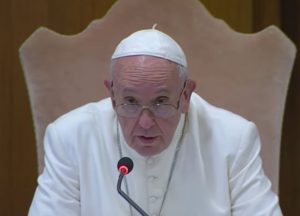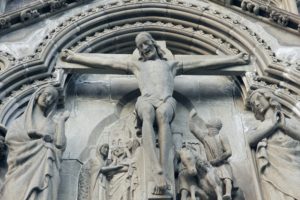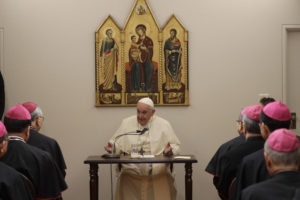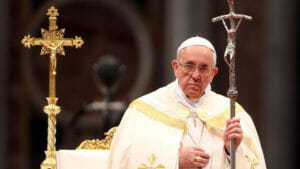Pope Francis Diagnoses the Vatican’s Spiritual Diseases at Christmas Meeting
Just in time for Christmas, Pope Francis gave the gift of a reality check to Catholic cardinals, bishops and priests gathered at the Vatican earlier this week.

Just in time for Christmas, Pope Francis gave the gift of a reality check to Catholic cardinals, bishops and priests gathered at the Vatican earlier this week, dressing them down for catching “spiritual Alzheimer’s,” as he put it, along with other ailments.
During the yearly exchange of holiday greetings Monday in the Sala Clementina of the Apostolic Palace at the Holy See, Francis rattled off 15 points he believes need work in the church’s top levels:
1) “The sickness of considering oneself ‘immortal’, ‘immune’ or ‘indispensable’, neglecting the necessary and habitual controls. A Curia that is not self-critical, that does not stay up-to-date, that does not seek to better itself, is an ailing body. … It is the sickness of the rich fool who thinks he will live for all eternity, and of those who transform themselves into masters and believe themselves superior to others, rather than at their service”.
2) “‘Martha-ism’, or excessive industriousness; the sickness of those who immerse themselves in work, inevitably neglecting ‘the better part’ of sitting at Jesus’ feet. Therefore, Jesus required his disciples to rest a little, as neglecting the necessary rest leads to stress and agitation. Rest, once one who has brought his or her mission to a close, is a necessary duty and must be taken seriously: in spending a little time with relatives and respecting the holidays as a time for spiritual and physical replenishment, it is necessary to learn the teaching of Ecclesiastes, that ‘there is a time for everything’.”
3) “The sickness of mental and spiritual hardening: that of those who, along the way, lose their inner serenity, vivacity and boldness and conceal themselves behind paper, becoming working machines rather than men of God. … It is dangerous to lose the human sensibility necessary to be able to weep with those who weep and to rejoice with those who rejoice! It is the sickness of those who lose those sentiments that were present in Jesus Christ”.
4) “The ailment of excessive planning and functionalism: this is when the apostle plans everything in detail and believes that, by perfect planning things effectively progress, thus becoming a sort of accountant. … One falls prey to this sickness because it is easier and more convenient to settle into static and unchanging positions. Indeed, the Church shows herself to be faithful to the Holy Spirit to the extent that she does not seek to regulate or domesticate it. The Spirit is freshness, imagination and innovation”
5) “Sickness of poor coordination develops when the communion between members is lost, and the body loses its harmonious functionality and its temperance, becoming an orchestra of cacophony because the members do not collaborate and do not work with a spirit of communion or as a team.”
6) “Spiritual Alzheimer’s disease, or rather forgetfulness of the history of Salvation, of the personal history with the Lord, of the ‘first love’: this is a progressive decline of spiritual faculties, that over a period of time causes serious handicaps, making one incapable of carrying out certain activities autonomously, living in a state of absolute dependence on one’s own often imaginary views. We see this is those who have lost their recollection of their encounter with the Lord … in those who build walls around themselves and who increasingly transform into slaves to the idols they have sculpted with their own hands.”
“Existential schizophrenia” and “the illness of the funereal face” also figured in on Pope Francis’ official list of no-nos, which he presented in full before moving into the healing portion of his speech to his high-ranking congregation.
— Posted by Donald Kaufman.
Independent journalism is under threat and overshadowed by heavily funded mainstream media.
You can help level the playing field. Become a member.
Your tax-deductible contribution keeps us digging beneath the headlines to give you thought-provoking, investigative reporting and analysis that unearths what's really happening- without compromise.
Give today to support our courageous, independent journalists.






You need to be a supporter to comment.
There are currently no responses to this article.
Be the first to respond.